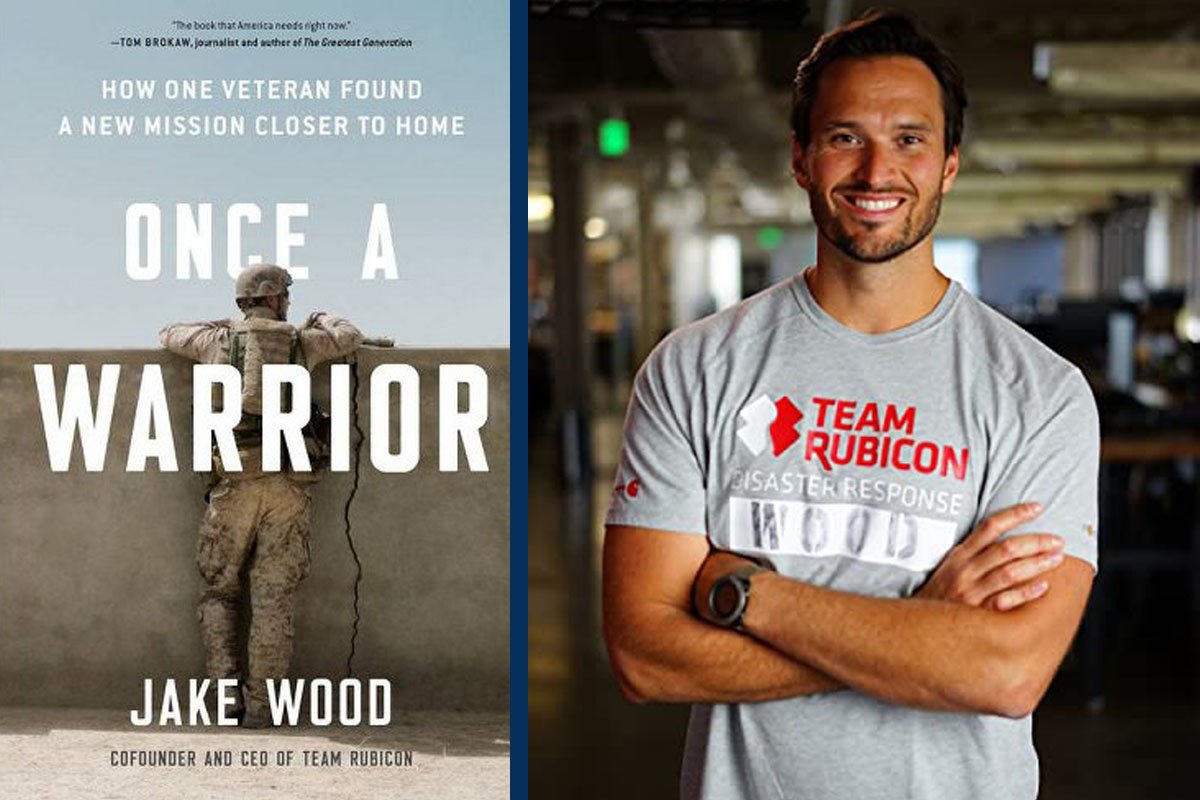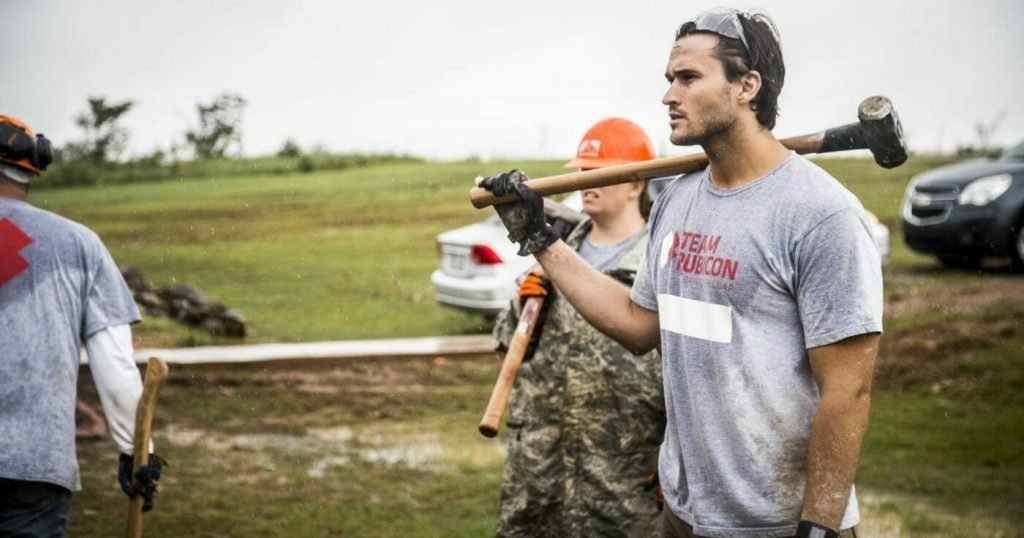
Photos courtesy of Amazon.
Within a decade after graduating from University of Wisconsin-Madison, the author serves as a Marine in Afghanistan and Iraq, co-founds the nonprofit Team Rubicon — and writes his first book.
His Take Command, Lessons in Leadership: How To Be a First Responder in Business was published in 2014 as a “tool kit” and is a fast read from the “evolving leader.”
A year after, Jake Wood is one of two veterans profiled in Joe Klein’s book about post-military service, Charlie Mike. Since then, Wood has fared better than the other subject, former Navy SEAL, founder of The Mission Continues, and author Eric Greitens, who resigned ignominiously as governor of Missouri.
Half a dozen years later Wood is back in hardcover. This time, in Once a Warrior, he writes about developing Team Rubicon — and, rewardingly, about becoming Jake Wood. (That’s his rear side on the front of the book jacket, although he is not identified. The book has his back, so to speak.)
By now the disaster-response organization and its CEO Wood are familiar names. Their mutual success is regularly lauded, and in 2018 Wood received the ESPN-ESPY Pat Tillman Award for Service, named for the soldier and former NFL player killed in Afghanistan in 2004.
Given Wood’s established public image, is there anything else to know about him?
Plenty, and Once a Warrior is valuable for its intimacy. The 37-year-old’s memoir is about leading from the heart. From his and, ultimately, to yours.
“Coming home from war is a lifelong process. Sometimes we try to fool ourselves into thinking that we’ve made it back, but that’s never the case.” The book “explores both the harrowing cost of military service” and the subsequent search for healing.
On one level, you get Rubicon rigor and resilient Wood, whose proposal for this publication was rejected 37 times six years ago. “On a higher level, this is the story of America’s veterans and the battles they continue to fight. Some prevail; others do not.”
His persistence gives him and his story power. The Iowa-born, 6-foot-6, college football-playing guy in an American-English “gray” (not the book’s British-English “grey”) Team Rubicon T-shirt is open about complexities, such as:
What makes a warrior: “I once drank whiskey until the sun rose with two men that were on the Osama bin Laden raid. […] But if they are the yardstick by which warriors are measured, then maybe I wasn’t one.”
Ill-heeled boots: Nine months after returning from Iraq, his battalion deploys to Afghanistan. “The Pentagon threw a thousand Marines into the bloodiest province of Afghanistan, told them to hold the line, and wished them luck.”
Intimations of mortality: “I’m amazed at the ease with which violence was normalized. I don’t say that with regret. I’m not sure I would have survived Iraq and Afghanistan if I hadn’t become comfortable with death.”
Reasons to return: “My urge to go back to war was not born of patriotism or idealism or a defense of good versus evil. It was driven by guilt and fear. Guilt that I’d come home unscathed. Fear that I would never be able to honor and make sense of my friends’ deaths.”
Being invisible: Wood describes a traumatic “recurring dream” that is a full-fledged nightmare: He is in the back seat of a car, in dress blues “with rows of shiny medals adorning my chest.” In the front seat are two men “in crisp green Marine Corps uniforms” and on death-notification duty, and they ignore him. Wood finally realizes the vehicle is arriving at his childhood home, and his parents are at the door. “I scream but hear no sound.”
Emerging from guilt: His fellow sniper and “smart and handsome” friend Clay Hunt killed himself in 2011, and he remains a beacon to Wood and Team Rubicon — but with an emotional toll. Might Wood have done more to keep Hunt alive?
“I was carrying Clay’s lifeless body with me through life, no differently than if I had slung him over my shoulder on the battlefield.
“I sought the weight because the weight brought pain. I wanted the pain because pain was the price I needed to pay for letting him down” in a “self-imposed sentence of guilt.”
Only “when I’d forgiven myself for Clay’s death,” Wood writes, is he “able to love [his wife], or anyone, again.”

Wood work: The book ends during the aftermath of Hurricane Harvey in 2017, when Rubicon volunteers “gutted 1,078” damaged homes in Houston. One of the houses is Hunt’s family’s, and Wood finds the folded flag he handed to Susan Hunt during her son’s memorial service six years earlier.
Susan approaches Jake. They pause. They think about Clay. They go on. “Come on,” he tells her, “we’ve got a job to finish.”
His Rubicon job is perhaps a mission in making sense. His losses are “no less tragic. The aching no less dull. But they were buoyed by a new sense of purpose and hope for a better tomorrow.”
What? A “hope for a better tomorrow”? The cliche is superfluous in a book whose strength is in its exposing wounds, not decorating them. Such a lapse into truism (“service was in their blood” is another) muddies the message. May his next book resist profundity’s temptation and rely on Wood’s personable style, evident here:
After a deadly firefight in Anbar province another Marine offers Wood a cigarette. His first.
Wood puffs, and the combat-tested, blood-stained cigarette “whispered sweet nothings and my body relaxed.”
He laughs. What’s so funny in a combat zone?
“I never smoked before,” he tells his buddy, “because this shit will kill you.”
Once a Warrior: How One Veteran Found a New Mission Closer to Home by Jake Wood, Sentinel, 320 pages, $27

J. Ford Huffman has reviewed 400-plus books published during the Iraq and Afghanistan war era, mainly for Military Times, and he received the Military Reporters and Editors (MRE) 2018 award for commentary. He co-edited Marine Corps University Press’ The End of Don’t Ask, Don’t Tell (2012). When he is not reading a book or editing words or art, he is usually running, albeit slowly. So far: 48 marathons, including 15 Marine Corps races. Not that he keeps count. Huffman serves on the board of Student Veterans of America and the artist council of Armed Services Arts Partnership and has co-edited two ASAP anthologies. As a content and visual editor, he has advised newsrooms from Defense News to Dubai to Delhi and back.
BRCC and Bad Moon Print Press team up for an exclusive, limited-edition T-shirt design!
BRCC partners with Team Room Design for an exclusive T-shirt release!
Thirty Seconds Out has partnered with BRCC for an exclusive shirt design invoking the God of Winter.
Lucas O'Hara of Grizzly Forge has teamed up with BRCC for a badass, exclusive Shirt Club T-shirt design featuring his most popular knife and tiomahawk.
Coffee or Die sits down with one of the graphic designers behind Black Rifle Coffee's signature look and vibe.
Biden will award the Medal of Honor to a Vietnam War Army helicopter pilot who risked his life to save a reconnaissance team from almost certain death.
Ever wonder how much Jack Mandaville would f*ck sh*t up if he went back in time? The American Revolution didn't even see him coming.
A nearly 200-year-old West Point time capsule that at first appeared to yield little more than dust contains hidden treasure, the US Military Academy said.












